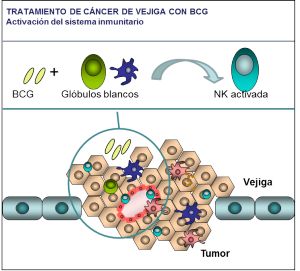One of the most commonly used methods to treat bladder cancer is to activate the patient's immune system by introducing the Calmette-Guérin bacillus (BCG), also used as a tuberculosis vaccine, directly into the bladder. Although BCG treatment has proven effective in 70% of patients, to date it was not known in detail how it exerts its antitumor effect.
A study published in the scientific journal Oncoimmunology now identifies the mechanism through which this therapy increases the ability of certain immune cells to recognize and kill the tumor cells.
The study, led by researchers from the Centro Nacional de Biotecnología of the CSIC (CNB-CSIC) in collaboration with scientists from the United Kingdom and doctors from Madrid hospitals Infanta Sofía and La Paz, shows that the presence of the bacterium in the bladder initiates a signalling cascade that involves different types of white blood cells, culminating in activation of the natural killer (NK) cells. These cells are responsible for eliminating cells that show any signs of sickness or transformation by a tumor process.
"It is important to understand how BCG therapy works in bladder cancer because, although this therapy yields good results, some patients have to abandon treatment due to adverse effects such as a burning sensation or irritation, caused by introducing live bacteria into the bladder," explains Dr. Mar Valés, lead author of the study and a CNB-CSIC scientist. "In-depth understanding of the mechanism by which the bacterium exerts its antitumor action opens the door to the design of new protocols that reduce side effects and increase the ability of NK cells to kill tumors," adds the scientist.
Immmunotherapy, the body’s own army against cancer
Activating immune system cells to recognize and fight against cancer, a strategy known as immunotherapy, is being explored by the scientific community around the world thanks to recent success with new anti-tumor therapies. Nonetheless, treatment of bladder cancer by introducing BCG directly into this organ already began several decades ago. The bacterium activates a local immune response that promotes tumor elimination.
"We have begun a new study with the intention of avoiding the adverse effects often associated with this therapy. We want to find ways to activate NK cells using bacterial fragments and soluble immunological factors, rather than whole bacteria," Valés says.
- Eva M. García-Cuesta, Gloria Esteso, Omodele Ashiru, Sheila López-Cobo, Mario Álvarez-Maestro, Ana Linares, Mei M. Ho, Luis Martínez-Piñeiro, Hugh T. Reyburn & Mar Valés-Gómez. Characterization of a human anti-tumoral NK cell population expanded after BCG treatment of leukocytes. Oncoimmunology 2017; e1293212






